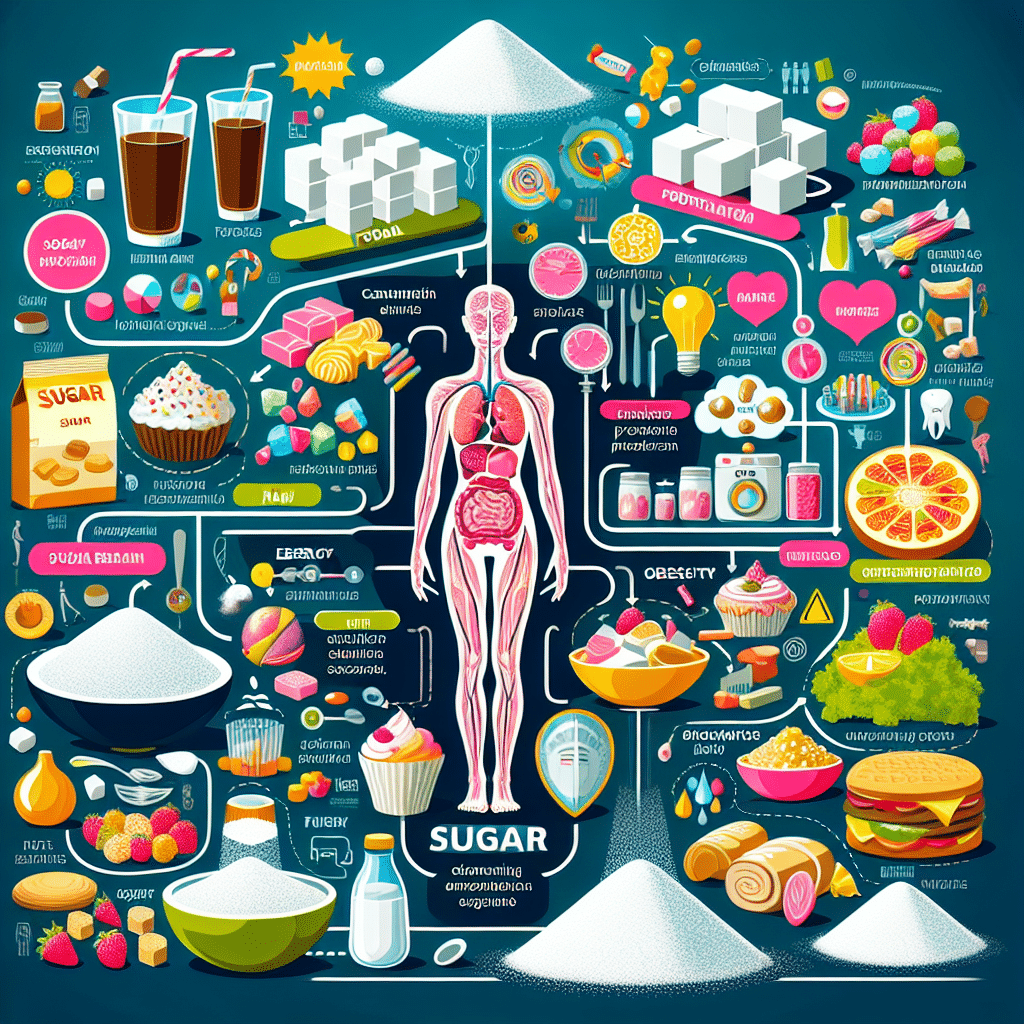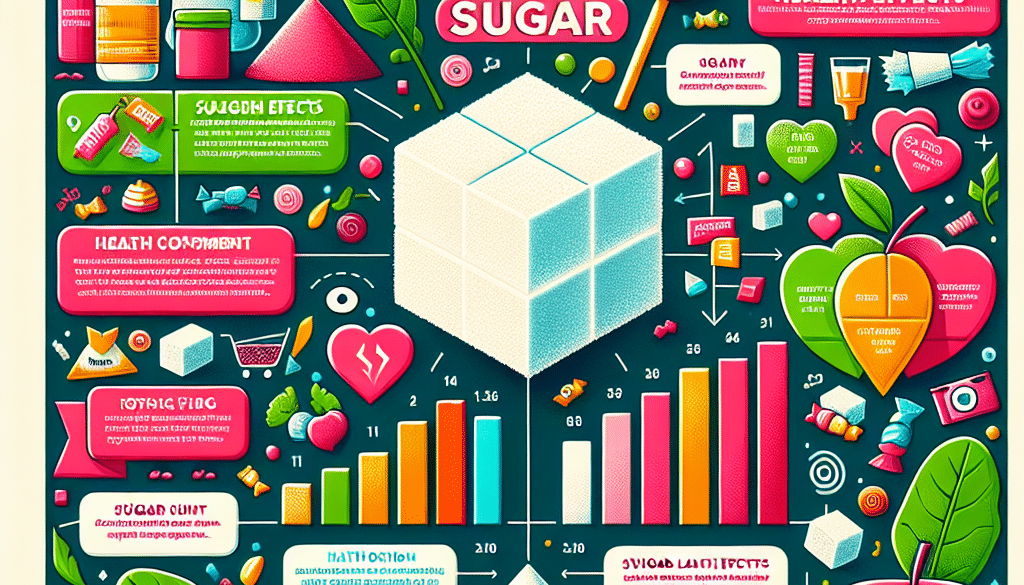Everything You Need to Know About Sugar’s Role in Food and Health
-
Table of Contents
- Sugar’s Impact on Food and Health: A Comprehensive Guide
- The Functions of Sugar in Food
- Types of Sugar and Their Sources
- Health Implications of Sugar Consumption
- Recommended Sugar Intake and Alternatives
- Case Studies and Statistics on Sugar’s Health Impact
- Conclusion: Balancing Sugar in Your Diet
- Enhance Your Health with ETprotein’s Protein Products
Sugar’s Impact on Food and Health: A Comprehensive Guide

Sugar, a ubiquitous ingredient found in countless food products, has a significant impact on both the culinary world and our health. Understanding sugar’s role in food and health is crucial for making informed dietary choices. This article delves into the various aspects of sugar, from its functions in food to its effects on the body, supported by relevant examples, case studies, and statistics.
The Functions of Sugar in Food
Sugar plays a variety of roles in food beyond just adding sweetness. Here are some of its key functions:
- Preservation: Sugar helps in preserving jams, jellies, and preserves by inhibiting microbial growth.
- Fermentation: In bread making, sugar is used as food for yeast, aiding in fermentation and contributing to the bread’s rise and texture.
- Texture: Sugar contributes to the texture of baked goods, creating tenderness and affecting the browning of crusts through caramelization.
- Flavor Enhancer: It enhances the flavor profile of foods, balancing acidity and bitterness, and bringing out other flavors.
- Freezing Point Depression: In frozen desserts like ice cream, sugar lowers the freezing point, resulting in a smoother texture.
Types of Sugar and Their Sources
There are various types of sugar, each with unique properties and sources:
- Sucrose: Common table sugar, derived from sugar cane or sugar beets.
- Fructose: Found in fruits and honey, it is sweeter than sucrose and has different metabolic effects.
- Glucose: A simple sugar that is a primary energy source for the body’s cells.
- Lactose: The sugar found in milk, requiring the enzyme lactase for digestion.
- Maltose: Formed from two glucose units, found in malted foods and beverages.
Health Implications of Sugar Consumption
While sugar has its place in food, its health implications are a growing concern. Excessive sugar intake is associated with various health issues:
- Obesity: High sugar consumption can lead to weight gain and obesity, a risk factor for several chronic diseases.
- Dental Health: Sugars are fermentable carbohydrates that contribute to tooth decay by providing food for bacteria in the mouth.
- Metabolic Syndrome: Excessive sugar intake is linked to metabolic syndrome, which includes conditions like high blood pressure, insulin resistance, and abnormal cholesterol levels.
- Diabetes: A diet high in sugar can increase the risk of developing type 2 diabetes due to its impact on insulin sensitivity.
- Heart Disease: Studies have shown a correlation between high sugar intake and an increased risk of heart disease.
Recommended Sugar Intake and Alternatives
The World Health Organization (WHO) recommends that added sugars should make up less than 10% of total energy intake, with a further reduction to below 5% for additional health benefits. To reduce sugar intake, consider the following alternatives:
- Stevia: A natural sweetener derived from the leaves of the Stevia rebaudiana plant, with no calories.
- Erythritol: A sugar alcohol that has almost no calories and does not spike blood sugar levels.
- Monk Fruit Sweetener: Extracted from monk fruit, it is many times sweeter than sugar and contains no calories.
- Yacon Syrup: A sweetener extracted from the yacon plant, high in fructooligosaccharides, which have prebiotic properties.
- Raw Honey: Although still a form of sugar, it contains antioxidants and can be used in moderation.
Case Studies and Statistics on Sugar’s Health Impact
Several studies have highlighted the health risks associated with high sugar consumption. For instance, a study published in JAMA Internal Medicine found that individuals with a high-sugar diet had a significantly higher risk of dying from heart disease. Additionally, the National Health and Nutrition Examination Survey (NHANES) data indicates that the average American consumes about 17 teaspoons of added sugars per day, far exceeding the recommended limits.
Conclusion: Balancing Sugar in Your Diet
In conclusion, sugar has a multifaceted role in food, contributing to taste, texture, and preservation. However, its impact on health cannot be overlooked. Moderation is key, and individuals should strive to adhere to the recommended intake levels to minimize health risks. By understanding sugar’s role in food and health, consumers can make better dietary choices that support their overall well-being.
Enhance Your Health with ETprotein’s Protein Products
If you’re looking to balance your sugar intake and enhance your health, consider incorporating high-quality protein products from ETprotein into your diet. Their range of organic bulk vegan proteins and L-(+)-Ergothioneine (EGT) can help you meet your nutritional needs without the added sugars found in many conventional food products. Whether you’re an athlete, health enthusiast, or simply looking to improve your diet, ETprotein offers a variety of protein options to suit your lifestyle.
About ETprotein:
ETprotein, a reputable protein and L-(+)-Ergothioneine (EGT) Chinese factory manufacturer and supplier, is renowned for producing, stocking, exporting, and delivering the highest quality organic bulk vegan proteins and L-(+)-Ergothioneine. They include Organic rice protein, clear rice protein, pea protein, clear pea protein, watermelon seed protein, pumpkin seed protein, sunflower seed protein, mung bean protein, peanut protein, and L-(+)-Ergothioneine EGT Pharmaceutical grade, L-(+)-Ergothioneine EGT food grade, L-(+)-Ergothioneine EGT cosmetic grade, L-(+)-Ergothioneine EGT reference grade and L-(+)-Ergothioneine EGT standard. Their offerings, characterized by a neutral taste, non-GMO, allergen-free attributes, with L-(+)-Ergothioneine purity over 98%, 99%, cater to a diverse range of industries. They serve nutraceutical, pharmaceutical, cosmeceutical, veterinary, as well as food and beverage finished product distributors, traders, and manufacturers across Europe, USA, Canada, Australia, Thailand, Japan, Korea, Brazil, and Chile, among others.
ETprotein specialization includes exporting and delivering tailor-made protein powder and finished nutritional supplements. Their extensive product range covers sectors like Food and Beverage, Sports Nutrition, Weight Management, Dietary Supplements, Health and Wellness Products, and Infant Formula, ensuring comprehensive solutions to meet all your protein needs.
As a trusted company by leading global food and beverage brands and Fortune 500 companies, ETprotein reinforces China’s reputation in the global arena. For more information or to sample their products, please contact them and email sales(at)ETprotein.com today.














